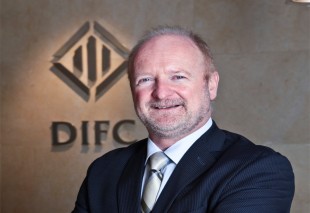

Interview: DIFC Properties CEO Brett Schafer

The CEO of DIFC Properties, Brett Schafer, reveals why phase two of the Dubai International Financial Centre masterplan revolves around new hotels, food and beverage, and an arts and culture scene to rival that of London’s Barbican
In a matter of just 10 years, Dubai International Financial Centre (DIFC) has proven itself on the global stage, with its financial ecosystem and infrastructure combining to trump the likes of Sydney, Luxembourg and Paris in the latest IMF World Bank listings.
A 110-acre free zone, the DIFC is now home to 1000+ companies, with 15,000 employees, across 15 million square feet of development. It aims to attract the very best, with 20 out of 25 of the world’s top banks, six out of 10 top global law firms, 11 out of 20 top money managers and six out of 10 of the world’s largest insurance companies established.
In both 2012 and 2013, DIFC ranked sixth in the world’s top international financial centres, as ranked by the IMF World Bank, behind only London, New York, Singapore, Hong Kong and Frankfurt.
In addition, DIFC has asserted its goal to be “more than a place to do business”, with a reputation as both a culinary hotspot and an arts and culture destination now firmly cemented in the Dubai community.
Now, as it celebrates its first decade of business, DIFC is gearing up for expansion, with phase 2.0 of a reworked masterplan ready for roll out and another 10 million square feet of development to come.
A new 10-year plan has been identified, which includes both the mandate to support Dubai’s mission to become the capital of Islamic Economy, as well as facilitate growth that will meet the real estate needs of DIFC clients and residents and establish DIFC firmly as a business and lifestyle destination.
Central to this vision will be the addition of hotels, restaurants, and arts and entertainment amenities that rival those of the leading financial centres.
The man tasked with delivering this is Brett Schafer, CEO of DIFC Properties, an independent entity established in July 2012 as part of DIFC Investments to manage the Centre’s real estate masterplan.
Appointed in 2013 and reporting to the board, Schafer brings with him 30 years’ commercial property experience, including the development of Dubai Festival City during an earlier role leading Al-Futtaim Group Real Estate, where he was responsible for projects and assets worth US $25bn.
Schafer is focused on finalising business plans for the first of the projects in phase 2.0, with a view to be awarding construction contracts before the end of the year.
Article continues on next page ...
Schafer reveals an increase in hospitality and housing projects in phase two. Ritz-Carlton is currently the only operational hotel, but work on the delayed Rosewood Dubai has recommenced, with opening scheduled for 2015. Two new smaller hotels are also planned, one a luxury boutique hotel and one possibly in the mid-market; a hotel is planned for an existing building, and there is provision for a further new hotel.
“We are excited because we think we are doing the first boutique hotel in Dubai, so that’s a niche,” says Schafer, referring to an AED250mn (US $68mn) new build on an empty lot between the Standard Chartered building and The Gate Village, for which a Gate Village office building was originally planned.
“We have boutique hotel operators…stampeding over each other to [get in] and what better location can you have than that,” says Schafer, highlighting the proximity to the Gate Village and its restaurants such as Zuma and Roberto’s.
“It’s 152 rooms to be exact. We expect to make an announcement within the next few months, with a view that when approved we’ll then launch the design,” says Schafer.
In line with DTCM’s initiative to encourage more three- and four-star development in Dubai — as part of its Tourism Vision 2020, which aims to attract 20 million visitors by 2020 — Schafer says he is “taking proposals for a four-star hotel at DIFC as well”.
“We may have one more hotel. We don’t want too many hotels. One of our plots has a potential residential tower, hotel tower and an office tower on one of them, so we may put in a hotel there but that’s aside from the four-star hotel that we’re looking at,” he clarifies.
There will also be new restaurants, with celebrity chef Greg Malouf scheduled to make his Dubai debut in September in the Al Fattan Currency House, as well as recent launches from Monaco’s Sass Café, Sweet Connections and The Steak Bar.
Meanwhile, arts and entertainment venues, are being developed with Sir Nicholas Kenyon, managing director of the Barbican in London.
Schafer reveals plans for cinema and live theatre, using Barbican as a “role model”. He comments: “If you look at all the financial districts in the world, the city of London is number one, and the Barbican is right in the heart of that.”
The remaining piece of the puzzle is the overall connectivity of DIFC, which is really what the masterplan is “all about”, says Schafer. He is keen to bring the ‘human element’ into the centre, creating a destination that attracts people seven-days-a-week.
“This is where we can make a USP, and the point of difference is the environment and places between the buildings, when people walk to the village, the restaurants and art shows; it’s a human scale, we’re adding to those amenities,” concludes Schafer.